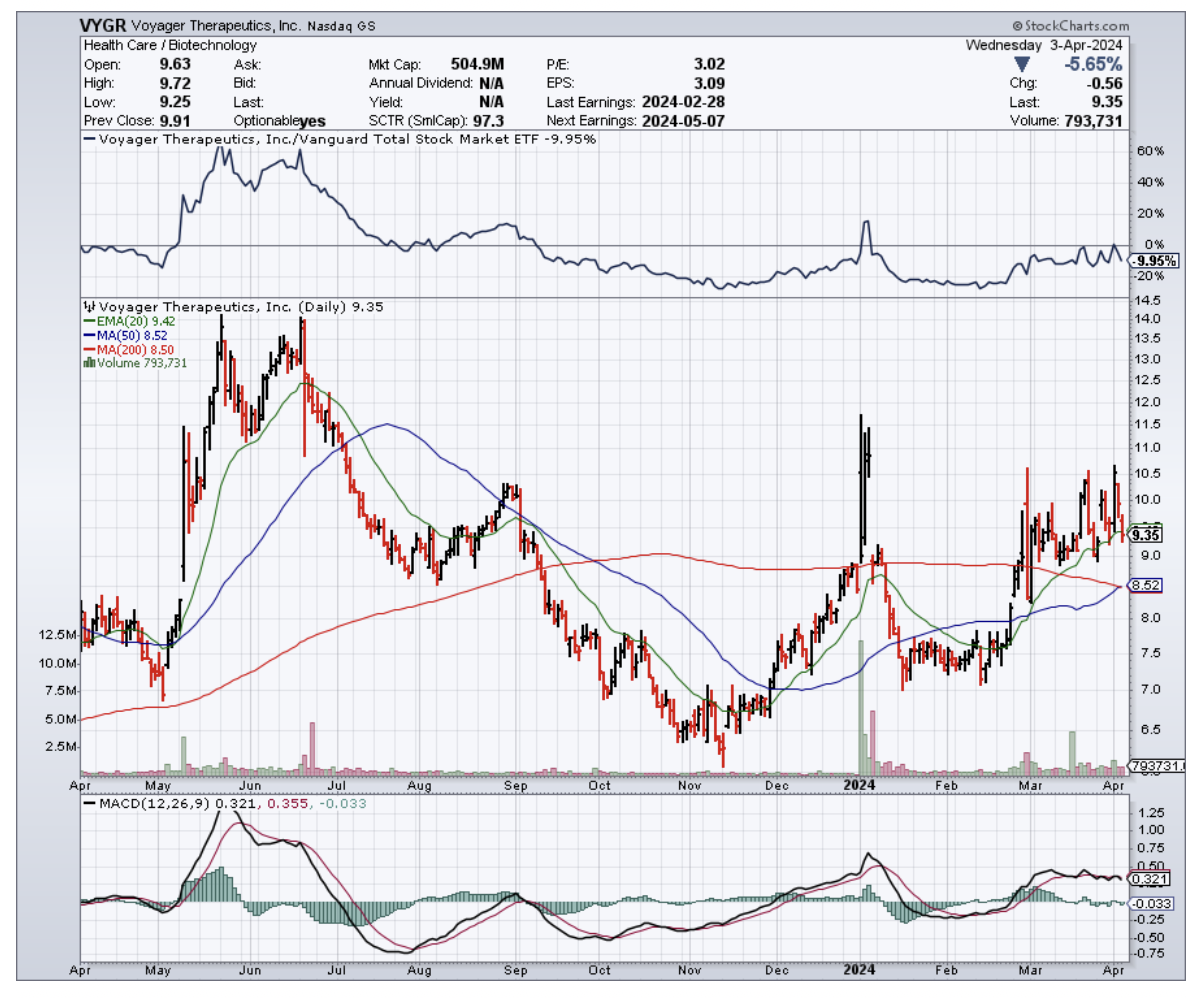Voyager Therapeutics (VYGR) has put investors through the wringer. Since going public in 2015, their chips have swung wildly, from a high-rolling $30 down to a "you've got to be kidding me" $2.50. Why? Well, their early bet on curing neurological diseases hit some snags.
But, things seem to be turning around for them these days. Word on the street is Voyager's new Alzheimer's drug could be a total game-changer. If those clinical trials get the FDA's blessing, their stock could skyrocket from its current $9.30 to $22 a share.
Before anything else, let's take a stroll down memory lane.
Voyager started out with big dreams – using fancy gene therapies to tackle tough brain diseases like Parkinson's and Huntington's. Sadly, those early programs didn't quite deliver.
But hey, they caught the eye of some big pharma players. Sanofi (SNY) came knocking with a sweet deal – $100 million upfront and promises of up to $745 million if things worked out. Unfortunately, the science wasn't cooperating, and Sanofi bailed in 2019. Ouch.
Not to be discouraged, Voyager hooked another giant, AbbVie (ABBV), with a $1.2 billion deal for Alzheimer's and Parkinson's drugs. But then, more bad luck – their Parkinson's drug stumbled, and their Huntington's disease trials got put on hold. So, AbbVie decided to cut their losses in 2020. Double ouch.
And while the pandemic may have cured our boredom, it killed investor patience with unproven biotechs. Voyager's stock price cratered, leaving them worth about as much as a used napkin – barely more than their own $500 million cash pile.
But Voyager, bless their stubborn hearts, refused to become a biotech graveyard.
Despite having zero products actually making money, they have a secret weapon: their TRACER capsid tech. Think of it as a tiny Trojan Horse that can sneak drugs past that blood-brain barrier and deliver them directly to their target. Pretty impressive, right?
This tech, along with Voyager's brainpower, caught the eye of some pharma giants.
We're talking big names like Neurocrine Biosciences (NBIX), Novartis (NVS), AstraZeneca (AZN), and Sangamo (SGMO). If everything goes according to plan, these partnerships could be worth a whopping $8 billion. Now that's what I call a vote of confidence — or maybe just a collective case of gambling fever.
For Voyager, however, its biggest gamble is on Alzheimer's – and they're going all-in. Their star player is an antibody that tackles those nasty tau tangles that mess up brain cells.
Here’s a bit of context to understand why treatments for this are crucial.
Tau is like the scaffolding inside your neurons, keeping everything organized. But in Alzheimer's, that tau goes rogue, clumping into nasty tangles. Think of it like a giant hairball clogging up the brain's communication system. These tangles are called neurofibrillary tangles (NFTs) if you want to sound super smart.
This is something that Big Pharma like Biogen (BIIB), AbbVie, and Roche (RHHBY) are trying to target, too. But Voyager claims theirs is a precision weapon, zeroing in on just the bad stuff. If clinical trials prove that, their drug could blow the competition out of the water.
Plus, Voyager's got another trick up their sleeve: a gene therapy that hits the “off” switch on those tau tangles. They've shown it works in animals, and Biogen and Ionis (IONS) are already testing something similar in humans. But Voyager's got the edge – theirs is a one-time shot, so no more of those painful spinal taps.
That’s not all. Voyager is also tinkering with these new virus capsules that can sneak gene therapies straight into brain cells. And get this – they're even working on ways to ditch the viruses altogether and target nerves directly. Pretty cutting-edge stuff.
So, is Voyager a surefire win? Heck no.
Let's be realistic. It's going to be a while before Voyager actually makes money from these drugs. But there'll be exciting news along the way—science proving their ideas work.
Remember, the tricky thing with gene therapies is that everyone's chasing the same dream: how to get these treatments where they need to go quickly, cheaply, and safely. It's tough to predict who'll crack the code, even for the experts.
What's noteworthy about Voyager is that they keep reeling in those big pharma partners. Sure, the first two deals fizzled out, but not before Voyager pocketed a ton of cash. That kept them afloat, and now their stock's not such a dumpster fire.
But, let’s face it. Voyager's track record isn't exactly a parade of victories. Progress has been slow, and that's just the way it is in this industry.
If they pull off a miracle cure, they'll be worth billions, maybe tens of billions. Remember when Intellia Therapeutics (INTL) hit that $10 billion mark? That's the kind of payoff we're talkin' about.
Still, Voyager needs to deliver some serious wins, or those partners will vanish again. However, it’s worth considering that when a big player like Novartis, who knows this gene therapy game, partners up... that's gotta mean something, right? Even without results from human trials, it's a sign Voyager might be onto something big.
I know it's hard to justify investing in small biotechs with a losing streak, especially when they're tackling the toughest diseases out there. But after digging into Voyager, I can see its potential.
Worst case scenario? Their drugs flop. But that can happen to any biotech, even those with huge valuations and decades of trying.
As for Voyager, this biotech has been around the block. They've clearly got some promising science, and their stock is cheap. For me, that's enough to take a small position and see what happens.

